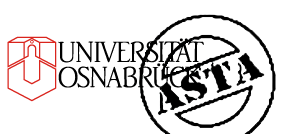FAQ - Data protection at online exams
In connection with digital examination formats, false claims are currently and probably also in the future being made about what can be checked and monitored by the university, the computer center or the respective teachers. For this, we have put together a small FAQ. This FAQ has been agreed upon in consultation with the data protection officer (Datenschutzbeauftragte*r) and the computing center (Rechenzentrum) of Osnabrück University (this does not, however, refer to our wording in the text, which we have put in italics). The questions we present here are based on the descriptions that students have given us or that we have experienced ourselves.
1. Is it possible to check whether, in the case of an interruption of the Internet connection, the students themselves are responsible?
No, it is not possible for the computer center to check why the Internet connection was interrupted.
2. Is it possible to check which websites are accessed by students while they are in an exam via Vips?
No, it is neither technically possible for the computer center to check this, nor is it permitted by data protection laws.
3. Does Stud-IP use cookies?
Yes, the cookie contains only the client number to identify the respective session, no other data, so only for login. The cookie is deleted when you log out/close the browser. Without the cookie you would have to log in again every time you change pages in Stud.IP. (see: Imprint Stud.IP, Privacy policy // Impressum Stud.IP, Datenschutzerklärung)
4. Is it permitted to store and compare the IP addresses of students during exams?
IP addresses are stored, but only for seven days. During this period, it is possible to compare the IP addresses, but this does not mean anything. It has happened that lecturers have wrongly pointed out to students that several students with the same IP address are not allowed to take an exam. This is wrong. For one thing, students have to write exams from home. If they live together with other students who are writing the same exam, they must also be given a certain amount of trust. On the other hand, student residences often have a common Internet connection and therefore an IP address, which does not mean that students also live in a shared flat.
5. Is it permitted to force students to turn on their webcam during seminars and exams? This question is relevant because the private rooms of the students can then be seen.
(To our knowledge, it is not possible at BBB to insert a background graphic so that only the respective person and not half of his or her room is visible. There are programs that make this possible, but to our knowledge there are no instructions given. The majority of the students do not know how to implement this and for older PCs this is technically not realizable.)
Since the videos are at least not recorded and stored, it is permissible under data protection law to demand that the webcams are to be switched on in order to take part in exams. However, it is not permitted under data protection law to request that the entire room is to be filmed or that the camera is to be used to pan through the room in which an exam is being written. Regardless of this legal assessment, we refuse to force students to turn on webcams, especially since students cannot always choose whether or not to take part in exams. As a first step, the university or the Ministry of Science and Culture (MWK) would in any case have to ensure that students have access to webcams and finance this if necessary.
6. Is it permitted to require students to upload or send a passport photo or identity card?
In principle, the CampusCard is sufficient. It is not understandable why a passport photo or identity card should be sent (uploading in folders visible to all participants of a course, e.g. Stud-IP, is not allowed anyway). At this point it should also be pointed out that sending or uploading (unencrypted) governmental ID documents always carries the risk of identity theft.
